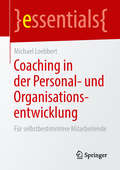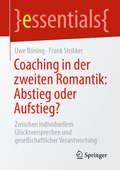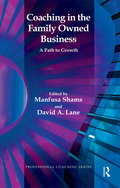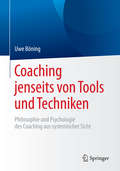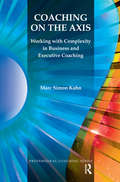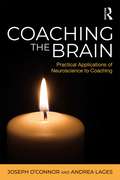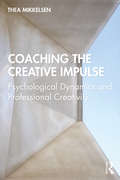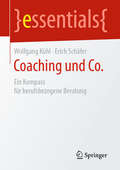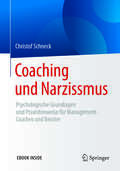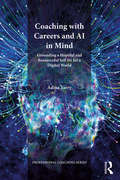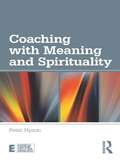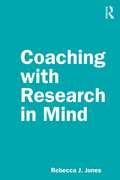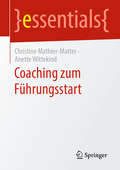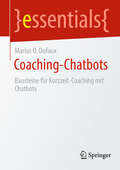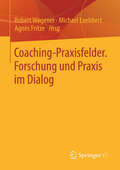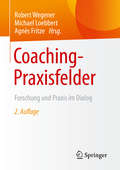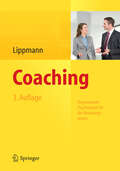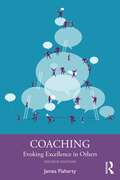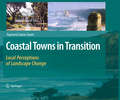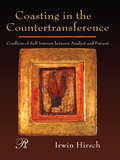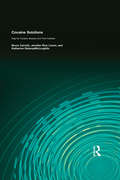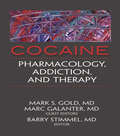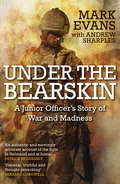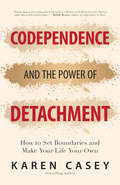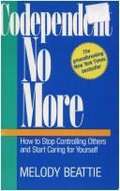- Table View
- List View
Coaching in der Personal- und Organisationsentwicklung: Für selbstbestimmtere Mitarbeitende (essentials)
by Michael LoebbertMichael Loebbert gibt in diesem essential einen Überblick darüber, wie Coaching in der Personal- und Organisationsentwicklung eingeführt und genutzt werden kann. Der Autor stellt Vorgehensweisen und Konzepte dar und weist auf Hürden sowie Risiken hin. Das traditionelle Verhältnis von Person und Organisation in der Arbeitswelt verändert sich. Personal- und Organisationsentwicklung als unternehmerische Funktion – den Mitarbeitenden die für sie passenden Arbeitsbedingungen zu schaffen – braucht und ist immer mehr Coaching. Coaching-Angebote, Coaching-Programme und die Verzahnung mit organisationalen Leistungsprozessen rücken deshalb in den Mittelpunkt moderner Personal- und Organisationsentwicklung.
Coaching in der zweiten Romantik: Zwischen individuellem Glücksversprechen und gesellschaftlicher Verantwortung (essentials)
by Uwe Böning Frank StrikkerDramatische Veränderungen verlangen eine neue Perspektive auf Coaching. Politische Veränderungen, Klimakrise, Digitalisierung und Corona verändern Coaching vehement. Die Autoren analysieren das Wechselspiel zwischen den gesellschaftlichen Lebens-und Wertentwicklungen, dem Selbstverständnis des Individuums und Coaching. Sie schildern den kritischen Einfluss der Positiven Psychologie auf Coaching und die disruptiven Veränderungen des Coachingmarktes durch die neuen Coaching-Plattformen. Ihre Position: Coaching muss sich offensiv diesen Herausforderungen stellen.
Coaching in the Family Owned Business: A Path to Growth
A scholarly work from leading coaching psychologists from all over the world that provides thoughtful analysis of group dynamics, family systems, and psychotherapeutic approach to family business coaching. The book provides both a theoretical groundwork and a practical application of group dynamic issues to family business coaching practices and will be a key reference for family businesses, practitioners, business coaches, researchers, postgraduate students, and coaching professionals.
Coaching jenseits von Tools und Techniken: Philosophie und Psychologie des Coaching aus systemischer Sicht
by Uwe BöningOb Psychologie, Philosophie, Soziologie oder Kunst - all diese Disziplinen und weitere können fundamentales Rüstzeug fürs Coaching bieten. Sie liefern Denkweisen und Ideen, die einen qualitativen und herausfordernden theoretischen Rahmen und kreative Impulse für die Praxis darstellen. Uwe Böning, Coaching-Pionier und -Vordenker, stellt in diesem Buch zentrale Themen aus den genannten Disziplinen zusammen und vermittelt damit ein tieferes Verständnis und einen ganzheitlichen Blick für unterschiedliche Varianten und Qualitätsstufen in der Praxis: Worauf kommt es im Coaching im Kern an? Was macht es nachhaltig erfolgreich? Und was macht den Unterschied zwischen Handwerk und Kunst im Coaching? Es geht um Ideen und Verständnis, Hintergründe und Haltungen - statt um Tools und Techniken. Ein Buch für Coaches und Coaching-Ausbilder, Berater, Führungskräfte und Personalmanager.
Coaching on the Axis: Working with Complexity in Business and Executive Coaching (The\professional Coaching Ser.)
by Marc Simon KahnThis book offers an approach to business and executive coaching that properly aligns the practice in the culture of business through the use of a relational "coaching axis" that helps to manage the complexity of the organisation and the individual as dual clients. Business and executive coaching occurs within an organisational context with the goal of promoting success at all levels of the organisation by affecting the actions of those being coached (Worldwide Association of Business Coaches, 2007). This form of coaching is distinct from other types in two ways, firstly it is focused on achieving business outcomes, and secondly, both the individual being coached and the sponsoring organization are simultaneously the client. This book explains how a coach manages the complexity of helping these two clients by acting as a narrative bridge between their stories. It offers a relational approach which resists remedial or curative notions born from coaching's human science roots and instead aligns to workplace realities.
Coaching the Brain: Practical Applications of Neuroscience to Coaching
by Joseph O'Connor Andrea LagesEverything we do, and sense, happens through our brain. In Coaching the Brain: Practical Applications of Neuroscience to Coaching, highly experienced coaches Joseph O’Connor and Andrea Lages ask and answer the question: ‘How can we use our knowledge of the brain to help ourselves and others to learn, change, and develop?’. This book will show you how to apply insights from the latest neuroscience research in a practical way, in the fields of personal development, coaching and cognitive therapy. Accessible and practical, it begins with an overview of how the brain works along with an explanation of how our brain changes due to our actions and thoughts, illuminating how these habits can be changed through neuroplasticity. Understanding the neuroscience of goals and mental models helps us to work with and change them, and clarity about emotions and the emotional basis of values can help achieve happiness. Most importantly, neuroscience illuminates how we learn, as well as the power of expectations. The book also explores the key lessons we can take from neuroscience for high performance and leadership. Eminently accessible, this book gives you new tools to help yourself and others create better futures. As a whole, the book will provide you with a new respect for the depth and complexity of your thinking and emotions. Coaching the Brain: Practical Applications of Neuroscience to Coaching, with its clarity and practical application, will be essential reading for coaches in practice and in training, as well as leaders, coach supervisors and HR and L&D professionals, and will be a key text for academics and students of coaching and coaching psychology.
Coaching the Creative Impulse: Psychological Dynamics and Professional Creativity
by Thea MikkelsenIn Coaching the Creative Impulse, Thea Mikkelsen presents an accessible and engaging guide to understanding and utilizing creativity at work. This unique book will give professionals and creative individuals a set of tools to help tackle and understand more deeply the psychological obstacles that may arise when navigating their career path, allowing them to thrive in their roles and master their craft. Based both in practice and in theory, Mikkelsen’s innovative approach is framed around Freud’s structural model of the superego, ego and id and Mikkelsen's decade worth of experience as a coach and leadership developer. She begins by clearly defining creativity and goes on to identify the psychological processes involved, considering the contribution of language, professional relationships, motivation and working as a group. Using case studies throughout, Mikkelsen also assesses the causes of creative blocks, the value of external feedback and the challenge of balancing experiences of success and failure. Featuring rewritings of real examples from her own work with professional creatives, this book provides a framework for managing inner conflicts and discovering a creative destiny. This state-of-the-art guide will be essential reading for all people who want to use their creativity and their personality in their work, and those who coach, lead and manage them. It will be of great interest to anyone working in a creative, technological or innovation-led industry, to HR and L&D professionals and to coaches of all backgrounds.
Coaching und Co.: Ein Kompass für berufsbezogene Beratung (essentials)
by Erich Schäfer Wolfgang KühlIn einer Arbeitswelt, die zunehmend durch Volatilität, Unsicherheit, Komplexität und Ambiguität gekennzeichnet ist und in der Wertschätzung zu einer Voraussetzung von Wertschöpfung wird, wächst der Bedarf nach Beratung sprunghaft. Gleichzeitig differenzieren sich die Beratungsformate aus. Somit wird es für die nach einer geeigneten Beratung suchenden Fach- und Führungskräfte schwieriger, die richtige Entscheidung für sich, ihre Teams und die Organisation zu treffen. In diesem essential werden die unterschiedlichen Beratungsformate prägnant dargestellt. Im Mittelpunkt stehen dabei ihre Begriffsbestimmung und Entwicklung, ihre konzeptionellen Grundlagen sowie ihre Einsatzmöglichkeiten. Das Buch bietet eine Orientierungshilfe, um professionelle Beratung zu erkennen und qualifizierte Berater*innen zu finden.
Coaching und Narzissmus: Psychologische Grundlagen und Praxishinweise für Management-Coaches und Berater
by Christof SchneckDieses kompakte Fachbuch bietet einen #65533;berblick #65533;ber Narzissmus und narzisstische Ph#65533;nomene im Management-Umfeld und skizziert einen idealtypischen Verlauf eines Management-Coachings von narzisstischen Pers#65533;nlichkeiten. Neben psychologischem und psychodynamischem Grundwissen zum Narzissmus wird dessen Allgegenw#65533;rtigkeit im Management und deshalb auch im Coaching beschrieben. Management-Coaches finden in diesem praxisnahen Ratgeber konkrete Hinweise zu allen Phasen des Coaching-Prozesses. Ein Buch f#65533;r Management-Coaches, Trainer und Berater, aber auch f#65533;r F#65533;hrungskr#65533;fte und Projektleiter, die mit dem Ph#65533;nomen Narzissmus konfrontiert sind, beispielsweise in Person des Vorgesetzten, oder die den Mut haben, ihre eigenen narzisstischen Anteile zu reflektieren.
Coaching with Careers and AI in Mind: Grounding a Hopeful and Resourceful Self Fit for a Digital World
by Adina TarryCoaching with Careers and AI in Mind presents an integrated overview of life and career options for individuals caught in the transition to a new world of work - impacted by the fourth digital revolution - and the tension this creates. The book synthesises extensive career coaching experience, relevant models, scientific thinking, practical tips and research-based information about the future of work in a digital world. This is followed by a positive message and call to action, to build a strong personal core as a point of reference that enables change and flexible adaptation, to meet the future with hope and a better chance for success.
Coaching with Meaning and Spirituality: Coaching With Meaning And Spirituality (Essential Coaching Skills and Knowledge)
by Peter HysonCoaching with Meaning and Spirituality aims to help coaches with those occasions where a clients’ search for meaning needs to be addressed and explored. Working with spirituality in a coaching context can be difficult and unfamiliar for coaches, but in this book Peter Hyson provides a vocabulary to facilitate this exploration, and ultimately to help coaches to address their clients’ doubts and worries, especially in an economic climate where old certainties may be lost. Part I of this text argues the case for why coaches should be willing and able to explore areas of meaning and spirituality with coachees. It provides definitions and terminology. Part II uses case studies and activities to help coaches apply these definitions to specific contexts that we might face as coaches. The final part provides some deeper skill-development and extended resources. This book looks at motivation; legacy; drive to succeed; increasing profit; maintaining work-life balance; stress, breakdown and crises; and qualities of effective leadership. It will be especially useful for professional coaches, both the experienced and the relatively new, who coach in a variety of contexts. It aims to stimulate a new area of discussion across the wider coaching profession.
Coaching with Research in Mind
by Rebecca J. JonesHow can coaches maximise the effectiveness of their practice? What can research tell us about how and why coaching ‘works’? How can we use the evidence base to enable others to reach their full potential? Coaching with Research in Mind brings together cutting-edge research in coaching and psychology, accessibly summarises the findings, and provides a clear and specific breakdown of what research tells us coaches and leaders should be doing and why. Rebecca J. Jones provides practitioners with the information and guidance they need to apply research in their practice, explaining how coaches can understand coachee characteristics, how they impact the coaching process and how coaches should adapt their practice to accommodate them. The book explains how to identify which principles of the coaching process influence effectiveness and tailor practice to maximise their impact. Jones also explores the impact of environmental factors and assesses how their influence can be limited. Coaching with Research in Mind will be essential reading for both new and experienced coaches looking to enhance the effectiveness and impact of their coaching, and for managers, leaders and L&D procurers who utilise coaching as a leadership style.
Coaching zum Führungsstart (essentials)
by Christine Mathier-Matter Anette WittekindEin Schritt auf der Karriereleiter wird zunächst positiv erlebt. Doch vieles entpuppt sich für die neue Führungskraft schnell als anspruchsvoll. Nicht gut gemeisterte Anfangssituationen in der Führung führen oft zu Problemen mit dem Team. Daher lohnt sich die Investition in eine Begleitung der neuen Führungskraft, nicht nur für diese selber, sondern für die gesamte Organisation. Der Fokus dieses essentials liegt auf dem Coaching zum Führungsstart. Coaches und Führungskräfte erhalten einen Einblick in erprobte Vorgehensweisen und eine Übersicht zu „Best Practice“, um die Führungskraft optimal auf die neue Rolle vorzubereiten. Die Theorie wird durch Fallbeispiele ergänzt.
Coaching-Chatbots: Bausteine für Kurzzeit-Coaching mit Chatbots (essentials)
by Marius O. DufauxDer technologische Fortschritt durchdringt auch das Coaching, wo Chatbots an Bedeutung gewinnen. Dieses essential bietet eine kompakte Einführung in Coaching-Chatbots und verbindet theoretische Grundlagen mit lösungsorientiertem Kurzzeit-Coaching. Praxisnahe Erkenntnisse und ethische Aspekte stehen dabei im Vordergrund und führen zum Design eines experimentellen Coaching-Chatbots, der besonders bei jüngeren Menschen wirksam ist und zugleich Herausforderungen benennt. Als Folge wird ein potenzieller Wandel in der Coaching-Branche skizziert und Coaches ermutigt, die Technologie für ihr Geschäftsmodell zu prüfen.
Coaching-Praxisfelder. Forschung und Praxis im Dialog: Forschung Und Praxis Im Dialog
by Robert Wegener, Michael Loebbert and Agnès FritzeCoaching ist längst nicht mehr nur in der Führungskräfteentwicklung und im Sport anzutreffen. Auch im Kontext weiterer Handlungsfelder wie beispielsweise der Politik, dem Gesundheitssektor, der Sozialen Arbeit oder der Wissenschaft findet Coaching vermehrt Verbreitung. Die rasche Weiterentwicklung von Coaching aufnehmend, leistet diese Publikation einen Beitrag dazu, die Konturen der immer deutlicher erkennbaren Coaching-Praxisfelder nachzuzeichnen. Mit den Beiträgen international namhafter Expertinnen und Experten aus dem deutsch- und englischsprachigen Raum werden dazu aktuelle Erkenntnisse aus Wissenschaft und Praxis präsentiert. Einen weiteren Teil der Publikation bilden Coaching-Praxisfelder übergreifende Themen wie Coaching-Programme, moderne Medien und Evaluationsansätze.
Coaching-Praxisfelder: Forschung und Praxis im Dialog
by Michael Loebbert Robert Wegener Agnès FritzeCoaching ist längst nicht mehr nur in der Führungskräfteentwicklung und im Sport anzutreffen. Auch in weiteren Handlungsfeldern wie beispielsweise der Politik, dem Gesundheitssektor, der Sozialen Arbeit oder der Wissenschaft findet Coaching vermehrt Verbreitung. Diese rasante Entwicklung aufgreifend, versucht die Publikation die Konturen der immer deutlicher erkennbaren Coaching-Praxisfelder nachzuzeichnen. Mit Beiträgen namhafter Expertinnen und Experten aus dem deutsch- und englischsprachigen Raum werden dazu aktuelle Erkenntnisse aus Wissenschaft und Praxis präsentiert. Einen weiteren Teil der Publikation bilden Coaching-Praxisfelder übergreifende Themen wie Programme, moderne Medien und Evaluationsansätze im Coaching.
Coaching: Angewandte Psychologie für die Beratungspraxis
by Eric LippmannCoaching ist in aller Munde, die Angebote sind zahlreich, der Markt ist mittlerweile von vermeintlich neuen "Tools", Techniken und Ansätzen etc. fast übersättigt und sehr unübersichtlich. Diese Buch hilft, den Überblick zu behalten. Es stellt wirklich relevante Coaching-Ansätze nach einheitlichem Raster vor: Das Wichtigste in Kürze, typische Fragestellungen, Fallbeispiele, Erfolgskriterien für Berater, Besonderheiten einzelner Zielgruppen. Es informiert über wichtige Settings im Coaching-Prozess: Einzeln, in der Gruppe, kollegial, extern oder intern, als Selbst- oder Online-Coaching. Es hilft bei der Abstimmung auf bestimmte Zielgruppen: Coaching für Führungskräfte auf allen Managementebenen, im Familienunternehmen, für Schulleiter oder Lehrer, im Personalmanagement oder in der Politik. Es gibt Tipps für unterschiedliche Anwendungsfelder: Coaching bei Veränderungsprozessen, bei Konflikten, im Rahmen der betrieblichen Bildung, im Umgang mit Medien, bei Laufbahnfragen, bei Freistellungen. Kurz: Es ist ein Standardwerk für Praktiker, geschrieben von Top-Fachleuten der Branche - nun in überarbeiteter dritter Auflage und mit neuen Kapiteln zu psychodynamischen Ansätzen, Diversity-Aspekten oder Coaching im Sport. Mit Serviceteil für Coaches und Coachees: Suche und Auswahl von Coaches, Links für Coaches zu Aus- und Weiterbildungen, Kongressen, Zeitschriften, kommentierte Literaturtipps.
Coaching: Evoking Excellence in Others
by James FlahertyNow in its fourth edition, the bestselling, seminal book by James Flaherty, Coaching: Evoking Excellence in Others, is an insightful, thought-provoking, pragmatic guide that dissects the art and science of coaching. This fourth edition includes two brand new chapters: the first is on finding one’s inner guidance and purpose in traversing the world of work, especially in more uncertain working environments; and the second is on the topic of somatic intelligence. As in earlier editions, this foundational book in coaching clearly presents the theories, concepts, and models, and then moves on to consider rigorous methods of practice and self-observation in a relationship of mutual trust, respect, and freedom of expression. It will probe you to rethink how you relate to your clients and your staff, how you produce long-term excellent performance in yourself, and how you can become more effective in helping others to achieve their goals. Coaching, Fourth Edition is a rich learning resource guide for new and experienced coaches who want to challenge their methods of partnering with clients. It is also an inspiring guide for training managers and leaders, human resource development managers, and general managers who want to develop their teams.
Coastal Towns in Transition: Local Perceptions of Landscape Change
by Raymond James GreenMany coastal areas around the world are experiencing dramatic landscape changes as a result of increased tourism development and the "sea change phenomenon" - the migration of affluent urbanites to small coastal towns seeking beautiful, natural surroundings. In response to these changes local residents in these places often complain that the distinctive character of their towns and/or individual neighborhoods is being lost or degraded. Coastal Towns in Transition looks at how changes due to unsympathetic development of the built environment and modification of the natural landscape are perceived to negatively impact on the character of small coastal towns. The book explores the concept of town character, and associated notions of sense of place, genius loci and place identity, as conceptualised by local residents in several coastal town communities along Australia's Great Ocean Road. Findings of a four-year study involving over 1800 respondents from these communities are used to explore theoretical and methodological issues associated with the assessment of place character in the context of coastal towns that are experiencing rapid environmental change. This book will be of interest to planners and environmental designers, as well as scholars in both landscape studies and social science and planning fields who are interested in the sustainable development of coastal areas. The case studies and associated planning and design strategies, together with the bibliography of selected relevant literature, will provide an invaluable reference for these scholars.
Coasting in the Countertransference: Conflicts of Self Interest between Analyst and Patient (Psychoanalysis in a New Key Book Series #Vol. 7)
by Irwin HirschWinner of the 2009 Goethe Award for Psychoanalytic Scholarship! Irwin Hirsch, author of Coasting in the Countertransference, asserts that countertransference experience always has the potential to be used productively to benefit patients. However, he also observes that it is not unusual for analysts to 'coast' in their countertransferences, and to not use this experience to help treatment progress toward reaching patients' and analysts' stated analytic goals. He believes that it is quite common that analysts who have some conscious awareness of a problematic aspect of countertransference participation, or of a mutual enactment, nevertheless do nothing to change that participation and to use their awareness to move the therapy forward. Instead, analysts may prefer to maintain what has developed into perhaps a mutually comfortable equilibrium in the treatment, possibly rationalizing that the patient is not yet ready to deal with any potential disruption that a more active use of countertransference might precipitate. This 'coasting' is emblematic of what Hirsch believes to be an ever present (and rarely addressed) conflict between analysts’ self-interest and pursuit of comfortable equilibrium, and what may be ideal for patients’ achievement of analytic aims. The acknowledgment of the power of analysts’ self-interest further highlights the contemporary view of a truly two-person psychology conception of psychoanalytic praxis. Analysts’ embrace of their selfish pursuit of comfortable equilibrium reflects both an acknowledgment of the analyst as a flawed other, and a potential willingness to abandon elements of self-interest for the greater good of the therapeutic project.
Cocaine Solutions: Help for Cocaine Abusers and Their Families
by Bruce Carruth Jennifer Rice Licare Katharine Delaney McloughlinAlthough the media focus on the rise of cocaine use and the evils of its abuse, the public receives little real information about the scope of the problem and its treatment. This timely, practical, and honest volume gets to the heart of the cocaine addiction problem. Cocaine Solutions not only addresses the difficulties experienced by addicts and their families in coping with the devastating financial, emotional, and psychological toll that addiction takes, it also identifies specific sources of help that exist for addicts and their families. Both recovered drug addicts themselves, the authors discuss some of the obstacles to recovery and the ways to overcome them. Cocaine Solutions includes the stories of recovering addicts to illustrate firsthand what addicts’lives are like, giving you a better understanding of the people who are afflicted with the disease of addiction. This important book is required reading for a wide audience--cocaine addicts, potential addicts, the families of addicted or potentially addicted persons, professionals who see addiction daily in their patients, and anyone who is interested in the problem of cocaine addiction.
Cocaine: Pharmacology, Addiction, and Therapy
by Barry Stimmel Mark GalanterHere is a timely volume that reviews the current state of knowledge of cocaine use. Some of the country’s leading authorities on cocaine use and abuse examine the pharmacology and neurochemistry of central stimulant abuse with a focus on the specific effects of cocaine. They also address recent experiences concerning the epidemiology of cocaine use from several different databases. This highly useful and informative book also explains the effectiveness of the existing diagnostic and treatment approaches.
Code Black: A junior officer's story of war and madness
by Mark Evans Andrew SharplesTrapped in an isolated outpost on the edge of the Helmand desert, a small force of British and Afghan soldiers is holding out against hundreds of Taliban fighters. Captain Mark Evans, a junior British officer, has been sent to take command of the Afghan troops. Under brutal siege conditions, running low on food and ammunition, he experiences the full horror of combat. As the casualties begin to mount and the enemy closes in, Evans finds both his leadership and his belief in the war severely tested. Returning home, he is haunted by the memories of Afghanistan. He can't move on and his life begins to spin out of control. Code Black tells a compelling story of survival against the odds and the scars war leaves behind.
Codependence and the Power of Detachment: How to Set Boundaries and Make Your Life Your Own
by Karen CaseyFind Boundaries and Peace from Codependent Behaviors“This book is bound to become a codependence classic. It should be required reading for all who seek to create healthy, balanced relationships.” –Claudia Black, PhD.Free yourself from codependency and reclaim your sanity, peace, and inner strength with this codependency book by Karen Casey, the bestselling author of Each Day a New Beginning.Learn how to value your own opinion over those of others. Codependency books are perfect for those of us who live as if what other people think matters more than what we think. This thinking leads to constantly trying to please or even to change others. Codependent behaviors can have negative effects on us and those around us, even leading to a dysfunctional family. It can be difficult to say no to those we love.A codependency book on improving your life through boundaries and peace. Karen Casey, bestselling author of Let Go Now and Each Day a New Beginning, has had her own experience with codependent behavior, and she is here to share what she has learned along the way. Through her own stories and the stories of those she has met through Al Anon meetings and elsewhere, she shows you how to detach from unhealthy codependency, create more positive relationships and, ultimately, lead a less stressful life.Inside, you’ll learn how to:Recognize and acknowledge your own attachments and codependencySet boundaries, find peace, and engage in healthy detachmentNurture positive relationships with the people in your life–both new and oldIf you liked codependency books such as The Language of Letting Go, Facing Codependence, or The Codependency Recovery Plan, you’ll love Codependence and the Power of Detachment.
